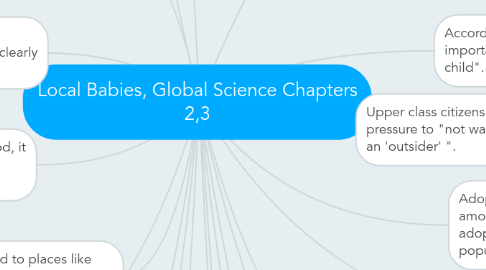Local Babies, Global Science Chapters 2,3
Soraia Macielにより

1. Often the lower class will travel from rural places in hopes of receiving IVF only to discover it is completely unaffordable. Many times they will sell off everything they own just for the chance of getting IVF.
2. The middle class are often highly educated but have jobs in the public sector keeping their wages low. Often they too will sell off their things or borrow money from relatives in hopes of getting IVF.
3. Migration labor to the Arab Gulf States becomes the only viable option for middle/upper class Egyptians for the wages are significantly higher.
4. Never the less many couples return to Egypt for IVF treatment because they feel the technology is superior .
5. The perception remains that IVF is only for the rich in Egypt.
6. The upper class will consider venturing abroad to places like the U.S to get IVF, only to discover their wages (although considered high in Egypt) are considered at poverty levels here.
7. For the lower class IVF is not well understood, it becomes an issue of morality and lack of knowledge.
8. Western notions of human reproductive technologies are considered "universal" but clearly they are not.
9. Procreation in Egypt is viewed as "monogenetic", men believe they produce life. Even with the more recent understanding of the female "egg" women are still blamed for infertility issues.
10. The middle and upper class pride themselves on their understanding of IVF and are avid readers on the subject. Lower class citizens rely on the media (many are illiterate) and things like soap operas for information which is not always accurate.
11. The issue of morality , the fear of "mixing sperm" makes lower class citizens shy away from IVF.
12. According to Egyptian society "the most important thing you must have is a child".
13. Adoption for Coptic Christians (which make up a small amount of the total population in Egypt) are permitted to adopt , but not Muslims which represent the majority of the population.
14. Upper class citizens and men of wealth feel the pressure to "not waste their inheritance and money on an 'outsider' ".
15. Upper class Egyptians can afford the luxuries of global reproductive technologies.
16. Inhorn describes "stratified reproduction" into (3) tiers: the upper class that can afford IVF w/o significant limitations, the middle class or those who can afford IVF but w/ limited circumstances, and lower class or those who can never afford IVF w/o the miracle of physician charity.
17. "3rd World" Governments cannot afford to support these reproductive technologies, so IVF becomes part of the private sector.
18. Israel (Egypt's neighbor) in contrast, a non Muslim country with clear western orientations and backings is the only Nation in the Middle East that offers government programs for new reproductive technologies.
19. The concept of "class" does exist in Egypt. According to a 1994 survey 27% of Egyptians live in poverty.
20. Egyptian Muslims do not own or use credit cards because the Islam religion prohibits interest on loans.
21. After 10 years of established IVF clinics in Egypt many people still view it as "bad" and "immoral", no one will admit to have done it. Recall that interviewers only agreed to talk to Inhorn once they were assured of anonymity.


